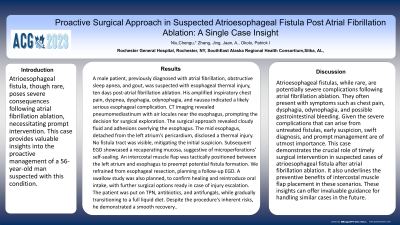Monday Poster Session
Category: Esophagus
P1893 - Proactive Surgical Approach in Suspected Atrioesophageal Fistula Post Atrial Fibrillation Ablation: A Single Case Insight
Monday, October 23, 2023
10:30 AM - 4:15 PM PT
Location: Exhibit Hall

Has Audio
- CN
Chengu Niu, MD
Rochester General Hospital
Rochester, NY
Presenting Author(s)
Chengu Niu, MD1, Tausif Syed, MD1, Muhammad Farhan Ashraf, MD1, Ali Jaan, MD1, Jing Zhang, MD2, Patrick Okolo, MD1
1Rochester General Hospital, Rochester, NY; 2Rainier Springs Hospital, Vancouver, WA
Introduction: Atrioesophageal fistula, though rare, poses severe consequences following atrial fibrillation ablation, necessitating prompt intervention. This case provides valuable insights into the proactive management of a 56-year-old man suspected with this condition.
Case Description/Methods: A male patient, previously diagnosed with atrial fibrillation, obstructive sleep apnea, and gout, was suspected with esophageal thermal injury, ten days post-atrial fibrillation ablation. His amplified inspiratory chest pain, dyspnea, dysphagia, odynophagia, and nausea indicated a likely serious esophageal complication. CT imaging revealed pneumomediastinum with air locules near the esophagus, prompting the decision for surgical exploration. The surgical approach revealed cloudy fluid and adhesions overlying the esophagus. The mid esophagus, detached from the left atrium's pericardium, disclosed a thermal injury. No fistula tract was visible, mitigating the initial suspicion. Subsequent EGD showcased a recuperating mucosa, suggestive of microperforations' self-sealing. An intercostal muscle flap was tactically positioned between the left atrium and esophagus to preempt potential fistula formation. We refrained from esophageal resection, planning a follow-up EGD. A swallow study was also planned, to confirm healing and reintroduce oral intake, with further surgical options ready in case of injury escalation. The patient was put on TPN, antibiotics, and antifungals, while gradually transitioning to a full liquid diet. Despite the procedure's inherent risks, he demonstrated a smooth recovery.
Discussion: Atrioesophageal fistulas, while rare, are potentially severe complications following atrial fibrillation ablation. They often present with symptoms such as chest pain, dysphagia, odynophagia, and possible gastrointestinal bleeding. Given the severe complications that can arise from untreated fistulas, early suspicion, swift diagnosis, and prompt management are of utmost importance. This case demonstrates the crucial role of timely surgical intervention in suspected cases of atrioesophageal fistula after atrial fibrillation ablation. It also underlines the preventive benefits of intercostal muscle flap placement in these scenarios. These insights can offer invaluable guidance for handling similar cases in the future.
Disclosures:
Chengu Niu, MD1, Tausif Syed, MD1, Muhammad Farhan Ashraf, MD1, Ali Jaan, MD1, Jing Zhang, MD2, Patrick Okolo, MD1. P1893 - Proactive Surgical Approach in Suspected Atrioesophageal Fistula Post Atrial Fibrillation Ablation: A Single Case Insight, ACG 2023 Annual Scientific Meeting Abstracts. Vancouver, BC, Canada: American College of Gastroenterology.
1Rochester General Hospital, Rochester, NY; 2Rainier Springs Hospital, Vancouver, WA
Introduction: Atrioesophageal fistula, though rare, poses severe consequences following atrial fibrillation ablation, necessitating prompt intervention. This case provides valuable insights into the proactive management of a 56-year-old man suspected with this condition.
Case Description/Methods: A male patient, previously diagnosed with atrial fibrillation, obstructive sleep apnea, and gout, was suspected with esophageal thermal injury, ten days post-atrial fibrillation ablation. His amplified inspiratory chest pain, dyspnea, dysphagia, odynophagia, and nausea indicated a likely serious esophageal complication. CT imaging revealed pneumomediastinum with air locules near the esophagus, prompting the decision for surgical exploration. The surgical approach revealed cloudy fluid and adhesions overlying the esophagus. The mid esophagus, detached from the left atrium's pericardium, disclosed a thermal injury. No fistula tract was visible, mitigating the initial suspicion. Subsequent EGD showcased a recuperating mucosa, suggestive of microperforations' self-sealing. An intercostal muscle flap was tactically positioned between the left atrium and esophagus to preempt potential fistula formation. We refrained from esophageal resection, planning a follow-up EGD. A swallow study was also planned, to confirm healing and reintroduce oral intake, with further surgical options ready in case of injury escalation. The patient was put on TPN, antibiotics, and antifungals, while gradually transitioning to a full liquid diet. Despite the procedure's inherent risks, he demonstrated a smooth recovery.
Discussion: Atrioesophageal fistulas, while rare, are potentially severe complications following atrial fibrillation ablation. They often present with symptoms such as chest pain, dysphagia, odynophagia, and possible gastrointestinal bleeding. Given the severe complications that can arise from untreated fistulas, early suspicion, swift diagnosis, and prompt management are of utmost importance. This case demonstrates the crucial role of timely surgical intervention in suspected cases of atrioesophageal fistula after atrial fibrillation ablation. It also underlines the preventive benefits of intercostal muscle flap placement in these scenarios. These insights can offer invaluable guidance for handling similar cases in the future.
Disclosures:
Chengu Niu indicated no relevant financial relationships.
Tausif Syed indicated no relevant financial relationships.
Muhammad Farhan Ashraf indicated no relevant financial relationships.
Ali Jaan indicated no relevant financial relationships.
Jing Zhang indicated no relevant financial relationships.
Patrick Okolo indicated no relevant financial relationships.
Chengu Niu, MD1, Tausif Syed, MD1, Muhammad Farhan Ashraf, MD1, Ali Jaan, MD1, Jing Zhang, MD2, Patrick Okolo, MD1. P1893 - Proactive Surgical Approach in Suspected Atrioesophageal Fistula Post Atrial Fibrillation Ablation: A Single Case Insight, ACG 2023 Annual Scientific Meeting Abstracts. Vancouver, BC, Canada: American College of Gastroenterology.
